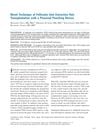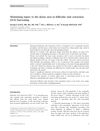 17 citations,
January 1997 in “Cell and Tissue Research”
17 citations,
January 1997 in “Cell and Tissue Research” Scientists developed a method to grow human fetal skin and digits in a lab for 3-4 weeks, which could help study skin features and understand genetic interactions in tissue formation.
 17 citations,
January 1995 in “The American Journal of Medicine”
17 citations,
January 1995 in “The American Journal of Medicine” The document concludes that proper diagnosis and tailored long-term treatment can effectively manage androgenic disorders in women, improving patient care outcomes.
 16 citations,
June 2021 in “Journal of Dermatological Treatment”
16 citations,
June 2021 in “Journal of Dermatological Treatment” Minoxidil effectively treats hair loss, especially androgenetic alopecia, but needs more research for better understanding.
 16 citations,
July 2020 in “Advanced functional materials”
16 citations,
July 2020 in “Advanced functional materials” 3D cell-derived matrices improve tissue regeneration and disease modeling.
 16 citations,
April 2014 in “Dermatologic Clinics”
16 citations,
April 2014 in “Dermatologic Clinics” Dermatoscopy helps diagnose hair and scalp disorders in people with Afro-textured hair, but more research is needed for better understanding and treatment.
 16 citations,
May 2013 in “Urology”
16 citations,
May 2013 in “Urology” Metabolic syndrome linked to urinary symptoms; hair loss not significant.
 16 citations,
October 2008 in “Dermatologic Surgery”
16 citations,
October 2008 in “Dermatologic Surgery” The new powered hair transplant method is faster and damages fewer hairs than the manual method.
 15 citations,
January 2020 in “ACS Applied Materials & Interfaces”
15 citations,
January 2020 in “ACS Applied Materials & Interfaces” Nanofiber structure helps regenerate hair follicles.
 15 citations,
January 2019 in “Experimental Dermatology”
15 citations,
January 2019 in “Experimental Dermatology” Lanyu pigs show that partial-thickness wounds can partially regenerate important skin structures, which may help improve human skin healing.
 15 citations,
November 2017 in “Drug Development and Industrial Pharmacy”
15 citations,
November 2017 in “Drug Development and Industrial Pharmacy” Improved tablets lead to faster, better drug absorption for hair loss treatment.
 15 citations,
February 2017 in “International Journal of Women's Dermatology”
15 citations,
February 2017 in “International Journal of Women's Dermatology” Hair aging and loss are caused by genetics, hormones, environment, and grooming, with treatments like minoxidil effective for certain types of hair loss.
 15 citations,
February 2017 in “International Journal of Women's Dermatology”
15 citations,
February 2017 in “International Journal of Women's Dermatology” Hair camouflage offers various options for hair loss, helping reduce psychological impact.
 15 citations,
December 2015 in “Textile Research Journal”
15 citations,
December 2015 in “Textile Research Journal” Adding amber particles to polyamide fibers makes them suitable for medical textiles like compression socks.
 15 citations,
September 2015 in “Journal der Deutschen Dermatologischen Gesellschaft”
15 citations,
September 2015 in “Journal der Deutschen Dermatologischen Gesellschaft” Skin doctors should recognize and treat conditions like hair-pulling and skin-picking early, often using therapy and medication, to help 50-70% of patients.
 15 citations,
October 2014 in “Hormone Molecular Biology and Clinical Investigation”
15 citations,
October 2014 in “Hormone Molecular Biology and Clinical Investigation” Some hair loss and prostate drugs might increase the risk of diabetes and heart disease.
 15 citations,
December 2007 in “Dermatologic Therapy”
15 citations,
December 2007 in “Dermatologic Therapy” Hair transplantation has improved with techniques that increase graft survival and patient satisfaction for more natural results.
 15 citations,
May 2004 in “Facial Plastic Surgery Clinics of North America”
15 citations,
May 2004 in “Facial Plastic Surgery Clinics of North America” New techniques in hair restoration surgery can fix unnatural results from old methods, improving patient self-esteem.
 15 citations,
November 2002 in “Cardiology in Review”
15 citations,
November 2002 in “Cardiology in Review” Cardiovascular drugs can cause various skin problems, so recognizing these reactions is important.
 15 citations,
May 1999 in “Cellular and Molecular Life Sciences”
15 citations,
May 1999 in “Cellular and Molecular Life Sciences” Minoxidil may cause heart issues in guinea pigs, suggesting potential harm for users with heart conditions.
 15 citations,
July 1991 in “International Journal of Dermatology”
15 citations,
July 1991 in “International Journal of Dermatology” Laser Doppler velocimetry is a valuable noninvasive tool for skin blood flow research in dermatology.
 14 citations,
September 2019 in “Eye”
14 citations,
September 2019 in “Eye” Some oral medications may help treat central serous chorioretinopathy, especially eplerenone, but more research is needed.
 14 citations,
July 2016 in “Fertility and Sterility”
14 citations,
July 2016 in “Fertility and Sterility” Changing the diagnosis criteria for PCOS might miss women at risk for related health issues.
 14 citations,
September 2014 in “Journal of Pediatric and Adolescent Gynecology”
14 citations,
September 2014 in “Journal of Pediatric and Adolescent Gynecology” Irregular menstrual cycles in teenagers are linked to a higher risk of polycystic ovary syndrome and metabolic syndrome.
 14 citations,
January 2001 in “Primary Care Update for Ob/gyns”
14 citations,
January 2001 in “Primary Care Update for Ob/gyns” Primary care doctors should address female sexual dysfunctions to improve women's sexual health and life quality.
 13 citations,
April 2020 in “Experimental Cell Research”
13 citations,
April 2020 in “Experimental Cell Research” PCAT1 helps hair growth by controlling miR-329/Wnt10b.
 13 citations,
February 2018 in “Plastic and Reconstructive Surgery”
13 citations,
February 2018 in “Plastic and Reconstructive Surgery” The study found that a specific signaling pathway helps skin wounds heal faster but may lead to larger scars.
 13 citations,
January 2017 in “Cosmetics”
13 citations,
January 2017 in “Cosmetics” Different tests are used to see how hair care products affect hair, and choosing the right test is important for accurate results.
 13 citations,
August 2016 in “Journal of Cosmetic Dermatology”
13 citations,
August 2016 in “Journal of Cosmetic Dermatology” Using normal saline in vertical extraction for hair transplants reduces donor area injury more than acute extraction.
 13 citations,
December 2013 in “Chemistry Central Journal”
13 citations,
December 2013 in “Chemistry Central Journal” Sunlight exposure increases drug toxicity; amber glass best for protection.
 13 citations,
December 2012 in “Cells”
13 citations,
December 2012 in “Cells” Targeting the actin cytoskeleton could improve skin healing and reduce scarring.





























